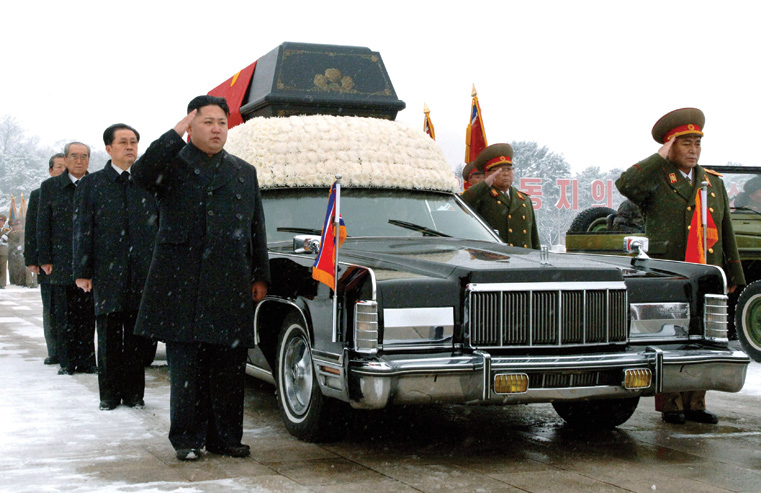Photo by Reuters/Kyodo
The Young, Unproven ‘Great Successor’
Thoughts on the third-generation (third-choice) ruler, Kim Jong Un
by Julie Ha
As of late December, the North Korean leadership appeared to be putting its best foot forward to show a nation in mourning over the passing of its “Dear Leader” of 17 years, but still moving confidently to ensure a rapid transfer of power. Within days of the announcement of Kim Jong-il’s death, the North’s official newspaper, the Rodong Sinmun, published a front-page editorial calling on the people to unite in support of Kim Jong-un, in keeping with his late father’s last wishes.
The newspaper referred to Kim Jong-un as the “successor to the revolutionary cause” and the “leader of the people.” He had been quickly elevated to the leadership post of the ruling Workers’ Party’s Central Committee, and the military’s top brass swore their allegiance to him.
What exactly do we know about Kim Jong-un? Almost nothing, said Korea expert David C. Kang, director of USC’s Korean Studies Institute. “We know he’s younger than 30 years of age, but we don’t know his exact age. We know he went to school briefly in Switzerland while a child, but have almost no information beyond that. He is reputed to like sports, although this tells us very little about hispersonality or leadership abilities.”
We also know that he was third pick, as his older brothers, Kim Jongnam and Kim Jong-chul, were passed up for, respectively, an embarrassing attempt to visit Tokyo Disneyland under a false name, and alleged effeminacy.
Not exactly the strongest vote of confidence, noted Hwansoo Kim, an Asian and Middle Eastern studies professor at Duke University. Such a succession doesn’t even follow the basic Confucian tradition of passing down the mantle of authority to the eldest son, which may raise some skepticism among the North Korean people, the scholar said.
Indeed, the North Korean state had many years to build up a deity-like mystique surrounding Kim Jong-il, including attributing supernatural feats to him. He may not have possessed the war hero-type credentials of his father Kim Il-sung, the founder of North Korea who fought Japanese colonialism and in the Korean War, but Jong-il did inherit the “spirit of juche ideology” advanced by his father, said Hwansoo Kim. This juche ideology of self-reliance and strong nationalism carried an almost religious quality, he said. “Will Kim Jong-un be able to sustain this sense of religiosity [to the extent] that he can garner the support of the people?” he asked.
A number of scholars have highlighted a greater number of challenges for this young leader, compared to when his father assumed power.
Kim Jong-il was chosen to succeed his father in the mid-1970s, noted Marcus Noland, a senior fellow at the Peterson Institute for International Economics and author of Korea After Kim Jong-il. “People say he was running the country on a day-to-day basis for 10 years or more as a kind of prime minister before his father’s death.”
By contrast, Kim Jong-un only emerged publicly after his father’s stroke in 2008. “He’s a much younger person, with a much more limited range of experiences,” said Noland. “He enters arguably a more difficult position, with a political situation that’s more fluid, an economy that’s more fluid.”
In 1994, North Korea was only a few years past close Soviet and Chinese support, said USC’s Kang. “At that time, the country had not yet experienced the devastating famine of the late 1990s that killed perhaps 1 million citizens,” he said. “Kim Jong-un will attempt to take and hold power in much more diminished circumstances. The country is weaker, poorer, has faced almost two decades of withering international pressure over its nuclear policies, and the citizens themselves are slowly learning more about the outside world than ever before.”
But one advantage the unproven leader has, said Noland, is that once Kim Jong-il began to have serious health issues three years ago, the North Korean leadership moved quickly to remold its National Defense Commission, formerly a group of old generals, into a modern steering committee for the country. “They expanded its size, brought in people from the party, younger people, people from themilitary industrial complex,” said Noland. “It appears they were actively constructing [a structure] from which Kim Jong-un could run the country.”
Kang also pointed out that, though Kim Il-sung died in 1994, Kim Jong-il did not take any “formal actions” as leader of North Korea until 1997. “By then the transition was quite stable,” he said. “It would not be surprising if the regime has planned the same thing for Kim Jong-un, with a relatively long transition period where senior leadership makes the decisions.”
And, during the funeral held for Kim Jong-il in late December, the public got its first look at the seven senior officials, all high-ranking party and military figures, who experts believe will be guiding North Korea in these first years of Kim Jong-un’s rule. The latter’s uncle, Jang Seong-taek, may be serving a major role as a regent for his nephew, analysts speculate.
Meanwhile, to address all the rampant speculation over the stability of this regime, Pyongyang issued this statement in the final days of 2011: “We declare solemnly and confidently that the foolish politicians around the world, including the puppet group in South Korea, should not expect change from us.”
This article was published in the January 2012 issue of KoreAm. Subscribe today!







